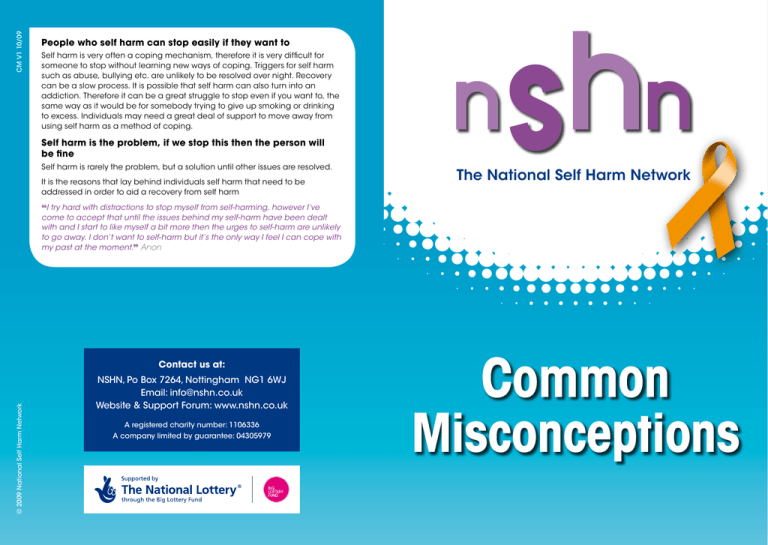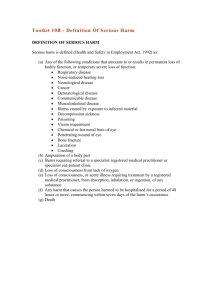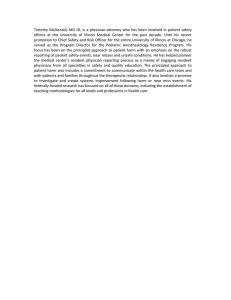Common Misconceptions
advertisement

CM V1 10/09 People who self harm can stop easily if they want to Self harm is very often a coping mechanism, therefore it is very difficult for someone to stop without learning new ways of coping. Triggers for self harm such as abuse, bullying etc. are unlikely to be resolved over night. Recovery can be a slow process. It is possible that self harm can also turn into an addiction. Therefore it can be a great struggle to stop even if you want to, the same way as it would be for somebody trying to give up smoking or drinking to excess. Individuals may need a great deal of support to move away from using self harm as a method of coping. Self harm is the problem, if we stop this then the person will be fine Self harm is rarely the problem, but a solution until other issues are resolved. It is the reasons that lay behind individuals self harm that need to be addressed in order to aid a recovery from self harm The National Self Harm Network ❝I try hard with distractions to stop myself from self-harming, however I’ve come to accept that until the issues behind my self-harm have been dealt with and I start to like myself a bit more then the urges to self-harm are unlikely to go away. I don’t want to self-harm but it’s the only way I feel I can cope with my past at the moment.❞ Anon © 2009 National Self Harm Network Contact us at: NSHN, Po Box 7264, Nottingham NG1 6WJ Email: info@nshn.co.uk Website & Support Forum: www.nshn.co.uk A registered charity number: 1106336 A company limited by guarantee: 04305979 Common Misconceptions Common Misconceptions There are a number of common misconceptions surrounding self harm. Self harm is attempted suicide All people who self harm are suicidal People often associate self harm with attempted suicide however this is rarely the case. People suffering emotional distress may feel suicidal but as self harm is a coping mechanism its function is predominantly to prevent suicide rather than being a suicide attempt. Some individuals that self harm may go on to complete a suicide attempt. It is unlikely however that self harm is the cause of such suicidal feelings. It is far more likely to be due to the reasons triggering the self harm, such as abuse, bullying, financial worries etc. rather than an extension of the self harm itself. A survey of 758 respondents carried out by NSHN showed that only 4% of these individuals stated that it was suicidal feelings that led to any of their individual incidents of self harm (Figures correct to August 2009). The feelings most often reported were self hatred, anger, frustration and worthlessness. ❝I don’t want to die. I just want this pain to stop. The only way I can get some relief from this emotional pain is by hurting myself.❞ Anon Attention seeking Self harm is often seen as a cry for help, a ploy to gain attention or as manipulation. However more often than not self harm is a very private and hidden behaviour that does not involve anyone else. Some people will take great care in hiding their injuries and scars through shame, embarrassment or fear. They may conceal injuries under clothing, jewellery or make up excuses and explanations. A large number of people who self harm treat their wounds themselves at home rather than seeking medical help. Other individuals who do let people know about their self harm may do this as they have no other way to communicate how they are feeling. Self harm for these individuals may be a cry for help. If someone goes to these extremes it is clear that they are in distress. The more serious the injury, the more serious the problem It is important to take all injuries seriously as the nature of the wound does not represent the extent of the anguish being experienced. ❝I feel it is inappropriate to ‘measure’ self harm in such a way. Yes, it may be useful to have some idea of the frequency and intensity and perhaps gain some understanding from that but I do not believe a) the amount of blood, b) number of scars/cuts is going to give you anywhere near the full story of what is going on.❞ Anon ❝If you meet someone who self-harms it is fundamental to treat them as an individual with respect and care, do not bother trying to gauge what is going on in their head by the number of stitches they need.❞ Gerard 24 They must like the pain Self harm is not about liking pain. It is a way to cope with thoughts and feelings that are depressing or distressing and to regain some control over how you feel. A lot of the time, individuals who self harm do not actually feel any pain due to adrenaline, instead they feel a release. Self harm can also be a mechanism that allows individuals to ‘feel’ something as the feeling of being emotionally numb and empty are common symptoms of depression. Such feelings of pain can also be used to ‘ground’ oneself in reality when feeling dissociated such as during flashbacks common with Post Traumatic Stress Disorder or manic episodes such as those experienced by individuals with Bipolar Disorder. In some cases individuals self harm to punish themselves. This may be due to feelings of guilt or shame. This is common in cases of sexual abuse and sexual assault. Individuals who self harm for these reasons are seeking pain but not for gratification. ❝When I self harm I don’t feel any pain at all, I just feel a sense of relief. It’s not until after that I feel the pain and that’s when I start to regret what I‘ve done.❞ Anon Self harm is a young person’s issue It is not only the young that self harm, triggers for self harm are experienced by people of all ages. ❝It’s not about attention-seeking. I go to great lengths to keep my scars hidden at all times.❞ Matt 27 Results from an NSHN survey (390 respondents) ❝It is absolutely not attention seeking, for most people it’s very secretive❞ Gerard 24 ❝In the small percentage of cases where it may be considered as attention seeking, there must be some issues that cause them to go to such extremes, so they need help to deal with the issues leading to them self harming just as much as anyone else.❞ Anon Under 16 9.5% 17–25 26–34 35–44 50.3% 21.7% 12.1% 45–54 55–64 0.5% 5.9% 65 Plus 0%


